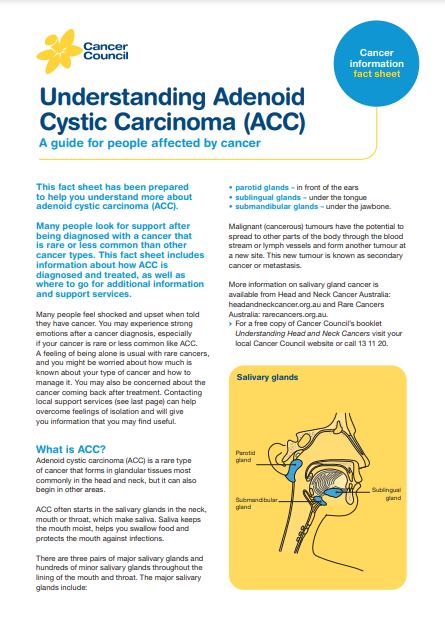- Home
- Adenoid cystic carcinoma (ACC)
- Managing side effects
Managing side effects
Here we look at the different side effects of adenoid cystic carcinoma (ACC) and its treatment, and ways to manage these.
Learn more about:
Side effects of treatment
All treatments can have side effects. The type of side effects that you may have will depend on the type of treatment and where in your body the cancer is. Some people have very few side effects while others can have more. Your specialist team will discuss all possible side effects, both short and long-term (including those that have a late effect and may not start immediately), with you before your treatment begins.
After surgery or radiation therapy to the head and neck area, you may need to adjust to significant changes. Everyone will respond differently – talk to your doctor about what to expect and try to see a speech pathologist and/or dietitian before treatment starts.
Some long-term side effects of treatment to this area include:
- mouth problems, including dry mouth
- heartburn or indigestion
- taste and smell changes
- swallowing difficulties
- speech or voice changes
- breathing changes
- appearance changes.
Common side effects
| Surgery |
|
| Radiation therapy |
|
| Chemotherapy |
|
Nutrition and exercise
If you have been diagnosed with ACC, both the cancer and treatment will place extra demands on your body. Research suggests that eating well and exercising can benefit people during and after cancer treatment.
Eating well and being physically active can help you cope with some of the common side effects of cancer treatment, speed up recovery and improve quality of life by giving you more energy, keeping your muscles strong, helping you maintain a healthy weight and boosting your mood.
You can discuss individual nutrition and exercise plans with health professionals such as dietitians, exercise physiologists and physiotherapists.
Learn more about nutrition and cancer and exercise and cancer or call 13 11 20.
→ READ MORE: Life after treatment
A/Prof Dion Forstner, Radiation Oncologist, St Vincent’s Hospital, Sydney, NSW; Nick Kelly, Consumer; Caitriona Nienaber, 13 11 20 Consultant, Cancer Council WA.
View the Cancer Council NSW editorial policy.
